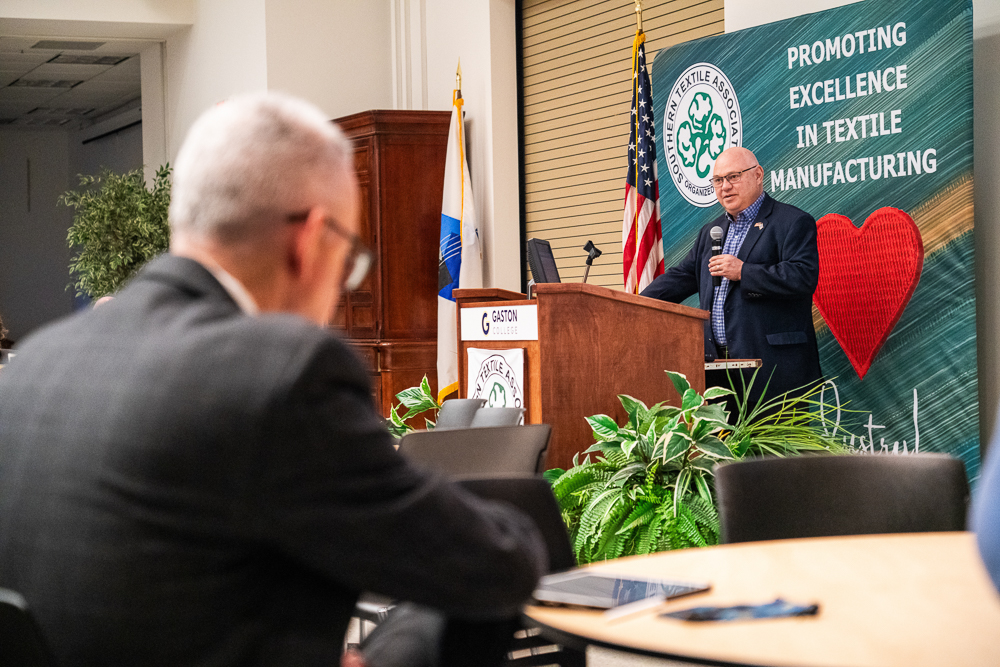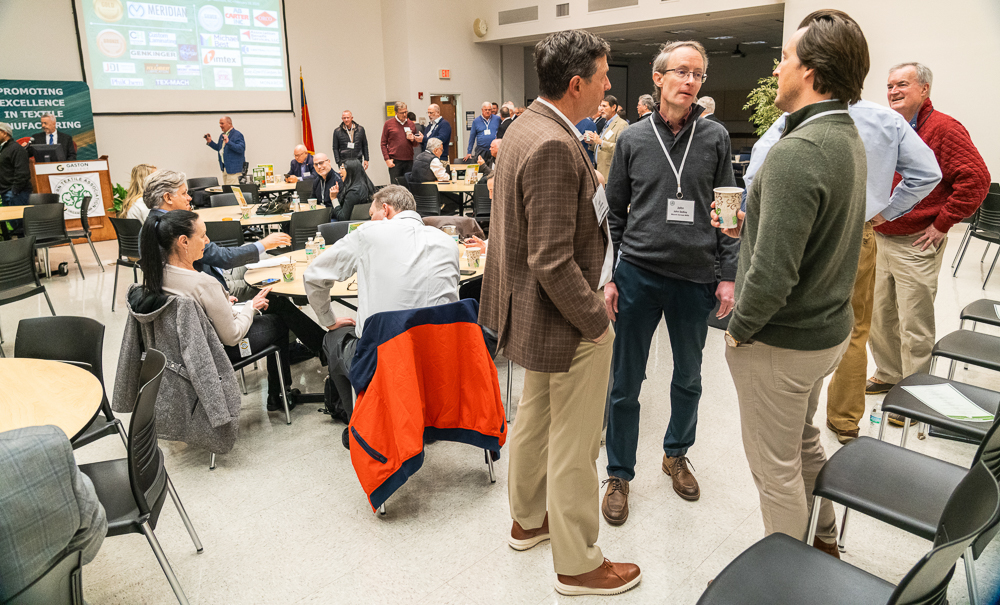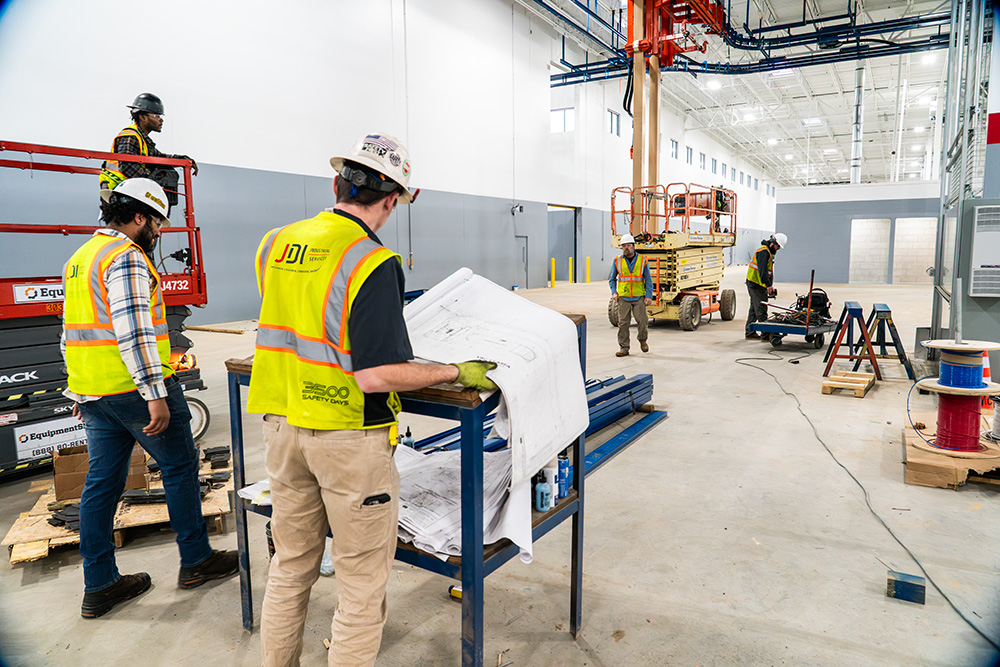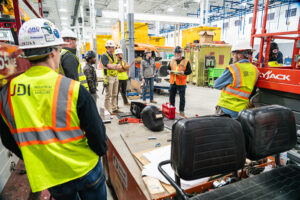Textile Giants Come together
The Southern Textile Association, Inc. (aka STA), established in 1908, is a nonprofit organization for individuals in the textile and related industries with a common interest in all phases of textile manufacturing.
The purpose of the Association as stated in its Charter is to promote good fellowship among its members; to exchange professional knowledge and experience on subjects relating to textile manufacturing.
It is also about promoting other social, educational, personnel relations, research, and other scientific activities for the benefit of the members, their companies , and the textile industry.
JDI Industrial Services joined the Southern Textile Association’s Winter Seminar at the Textile Technology Center at Gaston College in Belmont, N.C. to learn important news, and to tour the learning facility.
The event brings many dedicated professionals together, with roughly 100 industry experts in attendance who play a crucial role in the textile industry. H. B. Fuller associate, Andrew Evans, says that, “it’s important for us to be here so that manufacturers remember that we support their business across the Southeastern U.S. and beyond.”
Organizing such an event requires significant effort, and the STA has Devin Steele and Sandy Hamilton leading the educational and network-focused foray. Their first agenda at this meeting? They kick-off the event with an economics outlook from someone with a keen financial perspective and solid business acumen: Mark Vitner.
The Essence of the Economy
After spending the past 30 years as managing director and senior economist at Wells Fargo’s Corporate and Investment Bank, Mark Vitner founded Piedmont Crescent Capital this past year.
At his new firm, Mark provides analysis of the macro economy to clients located throughout the country and writes a series of reports on the US economy, local economies, small business, and residential and commercial real estate. He also provides economic content for CAVU Securities, writing their monthly newsletter, The CAVU Compass.
Mr. Vitner explains to the audience that despite concerns over inflation and the national debt, overall economic activity remained strong this past year and is beginning the New Year with strong momentum. Growth is strong but uneven.
“Those that locked in low-rate financing—businesses, homeowners, and state and local governments—feel secure, while renters and new buyers feel insecure,” says Vitner. Inflation affects households and businesses unevenly, a disparity reflected in consumer confidence and business surveys.
He continues to tell us that while Inflation peaked around the middle of 2022, “most of the improvement came from a reversal in the sharp run-up in energy prices and prices for used cars.”
Mr. Vitner states that, “inflation is moderating elsewhere but the pace has slowed considerably. The price level for food, housing, and most services remains nearly 26% above its pre-pandemic level, creating a sense of fatigue and malaise, which impacted the election.”
Positive, but Cautious
Mark, as an expert in the economics industry, believes that the The Fed’s rate cuts have failed to boost the housing market, but instead it “exacerbates the inventory shortage just as Millennials are starting families, driving home prices higher.”
Renters are also renewing leases more frequently, pushing up renewal rents, meaning housing costs remain prohibitively high for both renters and first-time buyers.
One positive note in Mr. Vitner’s outlook is how secular stagnation, which has hindered U.S. and global economies since the Global Financial Crisis, is ending. “Economic growth is expected to exceed expectations through the rest of the decade, with the strongest gains in regions where housing remains affordable, and regulations are minimal,” says Mark.
“Commercial development will follow population growth, which is primarily in the South and Mountain West. Tariffs may lead to short run disruptions in 2025, but the drag will ease afterward.”
The crowd feels hopeful, if a bit uneasy at his summary of the economy. The working man and woman are determined to get back to a time of prosperity, and these manufacturers seek to provide the space to do so.
Textiles: A web of Support
Energy leaders such as Fran Gesing, director of Products & Services at Duke Energy, and Charity McPhail, senior business energy advisor at Duke Energy spoke at the event.
They covered “Enhancing Efficiency: Energy Solutions for Textile Manufacturers,” and shared details about the various services and programs the energy provider offers to help companies become more efficient and save money.
They explained several projects that they engage with textile manufacturers directly to help them reach cost-savings goals and empower their communities. These included support for the energy efficiency journey, helping textile manufacturers such as Meridian Specialty Yarn leverage their programs, and providing guidance, technical support & project management for grid to plant.
Tim Voit, vice president of Strategic and International Sales at Thomaston Mills – makers of the American Blossom Linens brand of home textiles – presented “Chain of Fools? Reforming Supply Chains in the Age of Tariff Instability.”
The discussion focuses on the impact of China’s dominance on U.S. supply chains, highlighting the addiction to cheap imports and the environmental and economic costs. He noted the failure of NAFTA and CAFTA to protect U.S. textile industries, citing examples of local mills, undermined by cheaper foreign products.
Mr. Voit explained a brief history of tariffs and their effects on the economy, before asking if we can ever break the addiction to mostly Chinese goods. If we try, he continued, there must be coordination between key trading partners, and tariffs must be maintained at a high level for a long period of time, he said. Only then will investment flow to fill the gaps in supply chains in the USA and near shore, he added.
Reinventing the loom, and Spies
Wrapping up the day was Lisa Morales-Hellebo, founder & co-managing general partner of REFASHIOND Ventures; CEO & founder of REFASHIOND OS (rOS); and founder, of The Worldwide Supply Chain Federation.
She covered the “The State of Textiles & Soft Goods / 2025” and offered her vision for reshaping the textile and apparel ecosystem through collaboration, digital tools, advanced materials and manufacturing and next-gen supply chains. – and how we can get there.
Morales-Hellebo said she has been working diligently with the industry on a new “industrial transformation” of local-for-local, sustainable manufacturing and emphasized the importance of investing in new technologies and business models.
She is also involved with Department of Defense projects and informed everyone of the risks of ongoing spying, particularly in the supply chain industry.
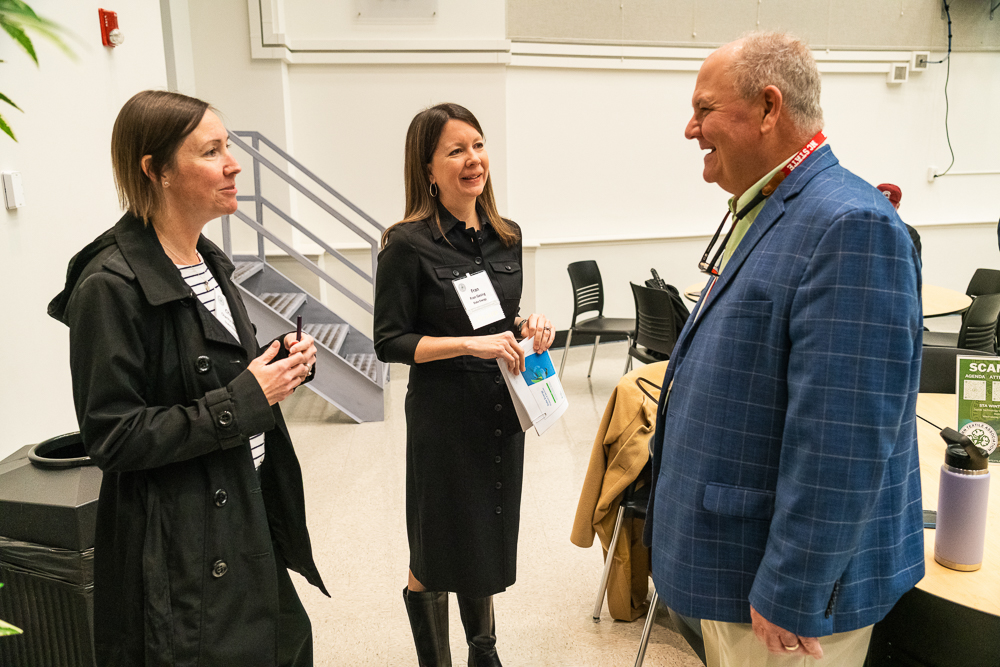
Emphasising Innovation
After the event, and a great lunch, JDI Industrial Services along with textile manufacturing representatives and suppliers take a tour of the Kimbrell Fiber Innovation Center at Gaston College. Located in Belmont, NC, it is an institute that is not only gearing to innovate and educate more than ever, it is a place that provides textile manufacturers a testing ground for their products and innovations.
We toured the 39,000 SF facility as a group, learning how the college processes fibers from the extrusion lab, spun yarn and filament processing areas, and incubation space for entrepreneurs.
The tour also included learning that a 14-member Advisory Board from all over the state assists the Textile Technology Center in its advancement and administration.
The current mission is to develop a world-class workforce for the textile industry in North Carolina and to support the textile industry by identifying problems confronting the industry and assisting the industry in solving them.
It is also important for garnering support from the textile industry for the work of the center, and serving as a statewide center of excellence that serves all components of the textile industry.
To accomplish this mission, the Center does new and sample product development, product testing, training, and consulting. Many pieces of state-of-the-art textile processing and testing equipment have been donated to the center to continue training and processing for the industry as a whole.
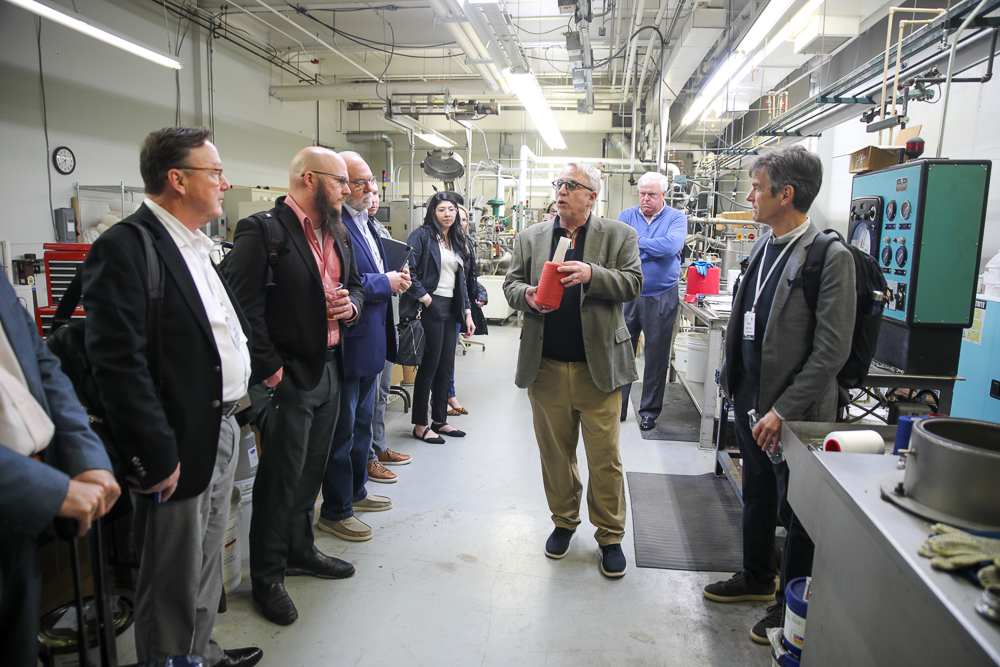
Outlook for Carolinian textiles
The economy appears to be moving past the secular stagnation to weighed on economic growth following the Global Financial Crisis. The Carolinas are well positioned to take advantage of stronger U.S. economic growth, as the region remains a top destination for people relocating within the U.S.
The region’s economy continues to diversify, attracting higher value industries in technology, life sciences, aerospace and advanced manufacturing.
Textiles in the Carolinas is moving towards a more AI-driven automation, yet still driven by world-class skilled workers who can keep their plants ahead of the competition.
The Importance of Mechanical Contractors in TEXTILES
Turn-key mechanical contractors play a critical role in the textile industry. They ensure the seamless integration of mechanical systems within buildings, can connect the various electrical systems and perform maintenance, and connect the process piping and cooling that is necessary to create an automated system that runs at higher durations.
These professionals’ expertise extends beyond installation. Our contractors at JDI are pivotal in maintaining and upgrading systems to ensure continuous efficiency.
They contribute significantly to the functionality and safety of facilities and their production lines. This impact is felt in both new constructions and retrofit projects. They also need to be able to connect with the right supplier network to bring affordable and high-quality parts to their clients.
Their involvement in energy management projects is increasingly vital. Additionally, they ensure buildings and processes meet modern energy standards and sustainability goals.
Selecting a Reliable Mechanical Contractor: Tips and Considerations
Choosing the right contractor is crucial for project success. Start by evaluating their experience and past projects. A proven track record with textiles and related industries projects often indicates reliability and expertise.
Consider the contractor’s certifications and licenses. Compliance with industry standards is essential. It ensures adherence to best practices and safety regulations, and ultimately, saves a manufacturer’s budget.
JDI has a mechanical license in the states of South Carolina, North Carolina, and Georgia. Due to our unlimited licensure, this allows us to work on your mechanical projects up to $100 mm.
Communication skills and customer service are also vital. As a contractor who communicates effectively, we can address concerns promptly. This helps in maintaining a smooth workflow for your textiles production and facilities projects.
Additionally, seek references or reviews from our past clients. Honest feedback can offer insights into JDI’s professionalism and work quality. Randy Blackston from Glen Raven is a wonderful example of the kind of relationships we build with leaders like you.
Innovative & Caring Contractors
Just as textiles is focusing within the United States, there is a need for a mechanical, electrical, and piping contractors to meet their needs.
Embracing innovation, keeping up with the latest technologies and skills, and sustainability, is key for future growth. As energy efficiency and smart building systems gain importance, mechanical contractors like us must adapt to stay relevant.
Continual professional development is crucial to JDI Industrial Services. By keeping up with technological advancements and regulations, we can provide the cutting-edge solutions manufacturers and facilities need.
This commitment ensures our essential role in modern infrastructure and construction projects as they continue to grow and build. We enjoy connecting with the Southern Textile Association to continue developing relationships in our industries.

